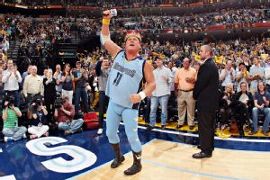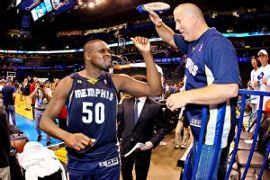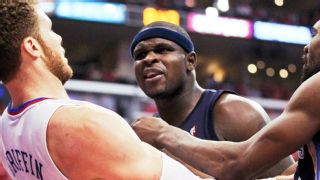|
Memphis has taken to calling itself Hoop City in reference to its affinity for basketball at the pro, college and high school levels. A more reasonable appellation might be the one longtime Grizzlies executive Chris Wallace bestowed on the city for the same reasons: The Basketball Capital of the South. But in a football-crazed region, if any sport -- or "sport," if we must -- rivals basketball for the collective, historical heart of Memphis, it’s professional wrestling. In the days before the then-WWF monopolized the wrestling world, Memphis was one of the great hotbeds of the sport's territorial system. For 20 years, a local, live Saturday morning wrestling show that broadcast from a midtown Memphis television studio drew staggering ratings. The Mid-South Coliseum, which now sits empty in the center of the city, was home to Memphis State basketball games but is probably more associated with weekly Monday night wrestling events that drew rabid fans from around the area. Zach Randolph’s cultural connection to Memphis has been well-chronicled, most convincingly by Randolph himself when he spoke to Doris Burke in a playoff postgame interview three years ago. Things never came easily to either him or his adopted city, Randolph said, words that might have been penned by “Soul Man” songwriter David Porter, himself a Grizzlies season-ticket holder.  But one secret to Randolph's Memphis appeal is that he’s a figure who evokes the city’s wrestling history more than its basketball history. With his big personality and combination of the physical and theatrical, Z-Bo's lineage descends more from local wrestling legends such as Sputnik Monroe, Jackie Fargo and Jerry Lawler than from local hoops legends such as Larry Finch and Penny Hardaway. But one secret to Randolph's Memphis appeal is that he’s a figure who evokes the city’s wrestling history more than its basketball history. With his big personality and combination of the physical and theatrical, Z-Bo's lineage descends more from local wrestling legends such as Sputnik Monroe, Jackie Fargo and Jerry Lawler than from local hoops legends such as Larry Finch and Penny Hardaway.
Randolph’s Grizzlies changed the tenor of playoff basketball in Memphis in part by being competitive after a prior history of postseason sweeps. But these Grizzlies also put playoff basketball in a more familiar local context, the tough but flamboyant personality of the team feeding the fan base’s wrestling-bred conception of sport as working-man’s opera, yielding “We Don’t Bluff” theme songs and "Whoop That Clip" chants. The former was plucked from a Randolph postgame interview after an altercation with Kendrick Perkins, the latter charged up by a Randolph vs. Blake Griffin rivalry that frequently unravels into double fouls and floor burns. Like an old-school wrestling card, there's a tinge of violence in the air, but it’s just for show. There is no intent to harm. This connection is made explicit each spring when Lawler appears during playoff games to hype up the crowd. Nationally, he’s mostly known as the cartoonish commentator for WWE broadcasts. But Lawler dominated the Memphis wrestling scene for decades as a charismatic good-ole-boy badass. Memphis wrestling, embodied by Lawler, fostered a culture where good guys aren't so clean-cut. They throw fire. They use chairs. They sometimes send Hollywood interlopers away on stretchers. And Lawler returns each spring to re-enact these rituals against jobbers wearing opposing teams' jerseys. One of Lawler’s trademarks came when he'd suffered enough punishment and was ready to put down his opponent. Lawler would pull down his shoulder strap as a silent signal that a comeback was about to commence, sending the Coliseum crowd into an involuntary frenzy. Randolph's ever-present headband is the foundation of a similar sartorial sacrament. When physical play from an opponent dislodges it, there’s a ripple of anticipation that runs through FedExForum -- a collective "oh no he didn't" -- as Randolph grimaces and growls and snorts. Tony Allen, who leaps up to flex his muscles when Randolph makes a bully-ball bucket, is the hype-man manager in this basketball-as-wrestling blend. Marc Gasol is, of course, Randolph's tag-team partner. And opposing stars play their proper roles. In the territorial heyday, Lawler was a Memphis constant, but bad guys -- monster "heels" of the week -- would come and go. Visitors such as Hulk Hogan or King Kong Bundy may have been bigger stars elsewhere, but when they came to Memphis they were just foils. And so it is with Griffin and Kevin Durant and Tony Parker. In a season of injury-related upheaval and win-loss regression, Randolph has been reliable and resurgent. While fellow core components Gasol, Allen and Mike Conley have all missed significant stretches to injury, Randolph has been absent for only three games. While the Grizzlies are struggling to secure a playoff bid, this is the healthiest and most productive homestretch Randolph has had in three seasons. Randolph was freshly returned from a major knee injury when the Grizzlies lost a first-round series to the Clippers two years ago. Last year, a March ankle injury had Randolph limping, literally and figuratively, into the spring. But right now, at age 32, Randolph’s jab-step jumper is as feathery, his first step as quick, and his post play as physical as it’s been since that New Year's Day knee injury in 2012. Randolph looks at older power forwards such as Dirk Nowitzki, Tim Duncan and David West -- all with games based more on toughness and skill than athleticism -- and believes he can maintain his current level of play for several more seasons. Yet Randolph may be the one member of the team's core heading toward a summer of uncertainty. Randolph has a $16.5 million player option for next season, and while both he and team management have hinted at an interest in a multiyear deal at a smaller per-year figure, what each side deems reasonable may not necessarily mesh. Randolph’s heart may be in Memphis, but neither his agent nor the Grizzlies' front office is likely to be as swayed by sentiment. And Randolph’s defensive decline may weigh as heavily as his offensive resurgence as the Grizzlies plan for their future.  But whatever happens this summer, Randolph has made clear that he’s put down roots, buying an 11,000-square-foot home in East Memphis that he envisions as his forever house, declaring himself a Memphian, whatever his future status with the Grizzlies may be. And that’s a profession of commitment no other NBA import has ever made. But whatever happens this summer, Randolph has made clear that he’s put down roots, buying an 11,000-square-foot home in East Memphis that he envisions as his forever house, declaring himself a Memphian, whatever his future status with the Grizzlies may be. And that’s a profession of commitment no other NBA import has ever made.
Randolph’s wish to retire in Beale Street Blue seems like an even bet at best, which means Randolph could be playing his final few home games at FedExForum. The city of Memphis could possibly lose Z-Bo, the basketball player, for a little while. But a city that loves Zach Randolph in a way that once seemed impossible can take solace in the faith that it will ultimately get him back. With the Grizzlies staggering toward the season’s finish line and a once presumed certain playoff spot very much in doubt, the curtain is threatening to close on what’s been one helluva show. But if the Grizzlies are fortunate enough to enter the postseason this spring and Lawler makes his annual appearance, my mind will flash to the future, a decade or more from now. The Grizzlies will be in the playoffs again, and during a third-quarter timeout it's not Lawler making an entrance but Randolph. Maybe he'll perform the Blake Griffin choke-slam of 2013 with a plant in a Clippers jersey or have a stare-down with a Kendrick Perkins look-alike. Maybe, poetically, it will be a co-conspirator in a Blazers jersey who knocks off Randolph's headband and cowers in the presence of his mean-mugging, provoking a mass “Z-Bo” chant for old-time's sake and again turning FedExForum into a Monday night card at the Coliseum, Southern Heavyweight Title on the line and the hometown hero about to rally. Chris Herrington is an entertainment editor and NBA contributor for the Memphis Commercial Appeal. Follow him, @HerringtonNBA.
|

